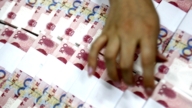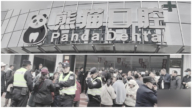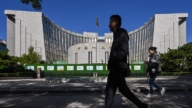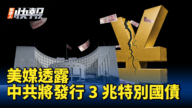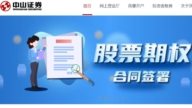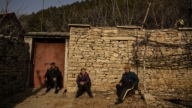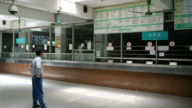【新唐人2013年10月11日讯】近年来,中共贪官滚滚外逃的赃款,不仅炒高了香港的房地产,也炒高了欧美国家的房地产。不过近来迹象表明,不只是中国资本在外逃,外商和国外银行也在大规模撤资。日前,日本媒体刊文指出,中国+富豪们的资金与欧美银行的资金一起,“像能预知大地震的动物一般”逃离中国。
“英国广播公司《BBC》”引述日本《产经新闻》驻北京分社长山本勋的报导说,中国经济前景存在的强烈悬念, 令腐败官员等族群加速向海外转移财产,美国和加拿大的豪宅开发,正由中国的投资者和富豪们掀起盛况。
根据中纪委的数据,2010年,从中国大陆流向海外的黑钱高达4120亿美元,2011年6000亿美元,去年预计已经突破万亿美元,今年很可能达到1万5千亿美元。中国流失的黑钱规模正急剧膨胀。占据国民生产总值(GDP)的20%。
去年《中国国际移民报告》显示:中国大陆个人资产超过1000万元的富人中,近60%已完成投资移民或有相关考虑。去年“胡润报告”说,超过85%的人计划将子女送到海外求学。
美国南卡罗来纳大学艾肯商学院教授 谢田:“中国民众逃离中国,脱离中共国,已经不是新鲜的事情,过去半个世纪60年一直有,过去2、30年更多,有钱的人,有知识的人,有智慧的人,有能力的人,有门路的人,都在争相离开中国,实际上中国社会,不管是从政治也好,经济也好,环境也好,都是一个非常不适合人类居住的地方。”
据美国媒体报导,中国投资者和富豪们的热门投资地点,已从美国纽约、洛杉矶、旧金山延伸到休斯顿、波士顿等地,而加拿大温哥华今年上半年,售出349幢价格在200万至400万加币的豪宅,主要买家正是中国+富豪。这些富豪使温哥华豪宅销售量,比去年同期增加77%。
美国“南卡罗来纳大学艾肯商学院”教授谢田怀疑,这些购买豪宅的富豪,都是中共贪官。
今年,第一位涉足投资中国的亚洲首富李嘉诚,接连抛售了他在中国和香港的300家大型超市,还抛售了他在上海和广州的高级办公楼宇,李嘉诚套现累积已经近500亿。
台湾大学经济系教授张清溪:“一年多前,就有经济学家说泡沫经济会破掉,叫他赶快卖掉,廉价脱手都好,这金融问题是蛮严重,因为政府在支撑,它可以维系一段,但是如果有一个突发事件的话,这些问题就会爆发出来。”
中国问题研究专家赵远明:“政治博弈当中,严重影响到经济层面的发展。对于投资家也好,银行家也好,贪官污吏也好,他对这个政权不抱什么希望,觉得早晚这个政权要垮,国家要分裂或动乱,那麽先作先期的准备,早走好过晚走。 ”
中国问题研究专家赵远明还指出,当下的中国社会乱象丛生,毒食品泛滥,污染严重,诚信缺乏,也是导致大公司、银行家、和有钱人纷纷逃离的原因。
今年,欧美银行也大举撤出中国。“美国高盛投资银行”抛售了它所持有的中国工商银行股;“瑞士信贷银行”和“英国苏格兰皇家银行”,则分别抛售了所持有的中国银行股﹔而今年九月,美国银行宣布,将全面抛售持有的中国建设银行股。
前中共财政部长项怀诚为此哀叹,美国银行抽回资金,标志着,欧美四大银行从中国全面撤资,流出资金超过20万亿人民币,令中国各地政府借贷陷入进一步艰难。
谢田:“西方公司出逃的原因,就是中国的经商环境日益恶化,还有西方资本对中共原来那些希望性泡影和幻想,开始破灭了。”
谢田还指出,随着通货膨胀加剧,中国境内工人的工资在上涨,投资成本上升,加上中国的资本集中在少数贪官和利益阶层手上,缺少真正的中间阶层,而造成中国内需潜力薄弱,对比欧美的油价及其他市场因素,投资者们发现,美国等国家的投资成本反而不高了。
采访编辑/刘惠 后制/君卓
Did Tycoons Flee China Predicting China’s Economic Collapse?
In Recent years, Chinese Communist Party (CCP) officials,
have fled abroad with ill-gotten money.
Their investments have pushed real estate prices to new highs
in Hong Kong, Europe and the US.
However, not only China’s capital is out flowing,
foreign business and banks are also withdrawing from China.
Japanese media said the Chinese tycoons and foreign banks
have removed their funds from china,
the phenomenon"like animals have predicted an earthquake".
BBC Chinese website cited Japan’s Sankei Shimbun, that
China’s economic future is uncertain, thus
corrupt officials accelerated the transferring of assets abroad.
Luxury property developments in the US and Canada are soaring
due to the Chinese investors and tycoons’ investments.
Chinese official statistics show, in 2010, US$412 billion
of corrupt funds were seen outflowing from China.
In 2011, the outflows reached $600 billion.
In 2012, the outflows exceeded one trillion US dollars.
In 2013, it is estimated US$ 1.5 trillion outflowed.
This phenomenon increasingly worsened.
It takes a total of 20% of China’s GDP.
2012 China International Migration Report indicated the rich,
whose personal assets exceed 10 million yuan ($1.63 million),
about 60% of them had completed an investment immigration,
or have relevant considerations.
Hurun Report in 2012 said that more than 85% of the rich
sent their children to study abroad.
Xie Tian, Professor at University of South Carolina-Aiken:
“Chinese people fleeing abroad is not news, it
has been happening for the past 60 years.
There has been even more happening in the last 2 or 3 decades.
People who are wealthy, knowledgeable, wise & capable
are eager to leave China nowadays.
Actually, in economic, political and environmental aspects,
China is not a proper place for a human being to live."
According to the US media, Chinese investors and tycoons
have expanded their popular investment locations,
ranging from New York, Los Angeles, San Francisco to Houston,
Boston and many other places.
In the last six months, 349 luxury houses were sold in Vancouver
Canada, each house worth US$19 million to UD$38.5 million.
The main bulk of these buyers are the rich Chinese.
They made Vancouver luxury house sales increase by 77%
year-after-year.
Xie Tian speculates that these house buyers
are corrupt Chinese officials.
This year, Asia’s richest man Li Ka-shing continuously sold
300 supermarkets in China and Hong Kong,
he also sold his office buildings in Shanghai and Guangzhou.
Sources say all these sales have generated HK$50 billion
(US$6.44 billion) of cash for Li.
Zhang Qingxi, Professor of Economics at National Taiwan
University:"One year ago, some economists said the economic
bubble will one day burst.
They advised Li Ka-shing to hurry up and sell, even selling
at cheap low prices is still good enough.
As China has serious financial problems,
the regime was backing it up, saying it can last longer.
However, if there is a sudden incident,
the problem will explode."
Zhao Yuanming, China affairs expert:
“The political struggle affects economic aspects.
For investors and bankers or corrupt officials,
they don’t hold out any hope for the regime.
They knew the CCP power would one day collapse.
The country may collapse or experience huge unrest.
They prepared early for this, and leaving as early as possible."
Zhao Yuanming also said, current China is in a chaotic state,
poisonous foods are everywhere, serious pollution to the land
and a complete lacking in morality.
This phenomena has caused large companies to shut down,
bankers and all wealthy people have fled to other shores.
This year, European and US banks
have withdrawn from China.
US Goldman Sachs sells all its shares in Industrial
& Commercial Bank of China.
Swedish Credit Suisse and Royal Bank of Scotland
sells all its shares in Bank of China.
In September, Bank of America sells all its shares
in Construction Bank of China.
Former Minister of Finance Xiang Huaicheng said, the
Bank of America withdrew all its funds.
It indicates that four major banks in Europe and the US
have transferred more than 20 trillion yuan
(US$3.27 trillion) overseas.
This has made local regimes borrowing
fall into further difficult times.
Xie Tian: “The reason for foreign funds outflowing from
China’s economic environment declining daily,
foreign investments in China didnot work, their hopes
and dreams became shattered."
Xie Tian also says that inflation is on the increase,
Chinese people’s wages are also rising.
The investment costs goes up, China’s wealth
is in minority hands and lacking in the middle classes.
These lead to potential weak domestic demands in China.
Compared to Europe, the US oil price and other market factors,
investors found that investment in the US and other
Western countries, costs are no longer that high.


